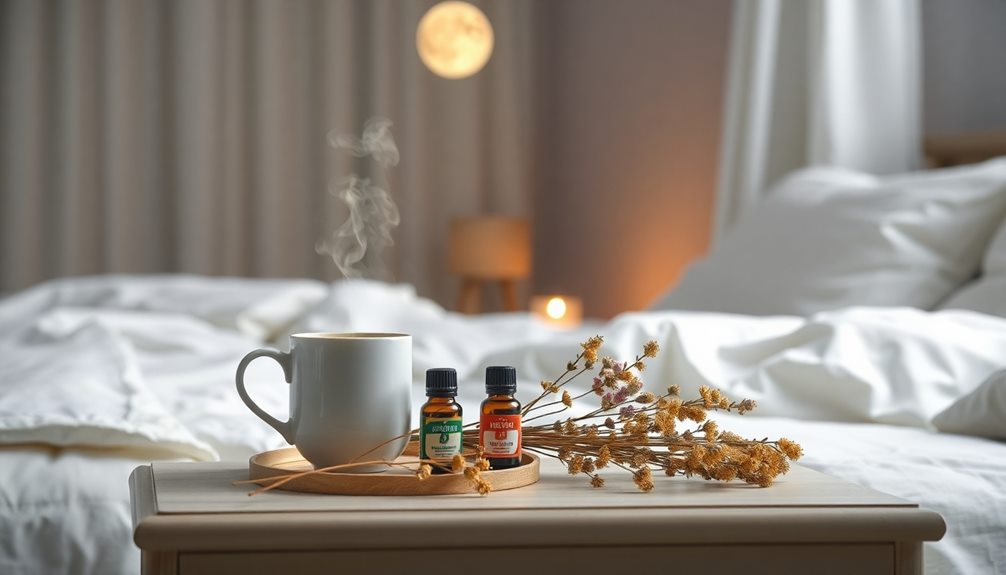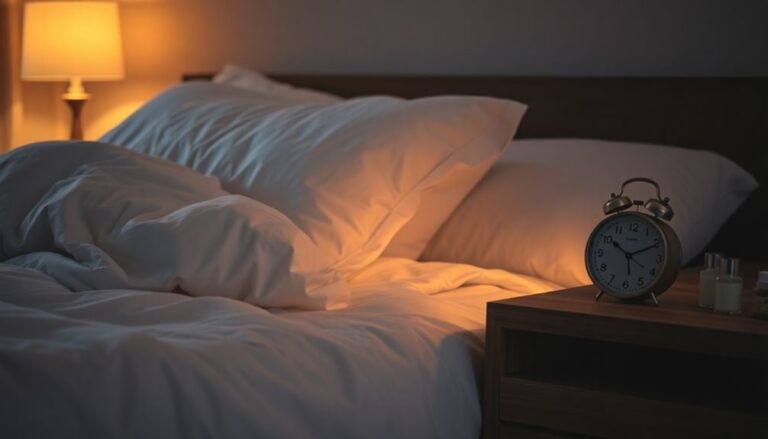When struggling with insomnia, you don't have to rely on pharmaceutical sleep aids. Instead, consider herbal supplements like passionflower, valerian root, and lemon balm, which work with your brain chemistry to calm the nervous system and regulate sleep patterns. These natural solutions can promote restful sleep without the risk of side effects or addiction. Valerian root, in particular, is known for its sedative properties, while chamomile and lavender oil can help you unwind before bed. By exploring these options, you'll discover a range of choices to help you find the best herbal sleep supplement for your unique needs and find a restful night's sleep.
Nightcap Notes
- Passionflower, L-Theanine, and GABA supplements increase brain GABA levels, leading to restful sleep and relaxation.
- Valerian root, chamomile, and lemon balm promote relaxation and reduce stress and anxiety for better sleep.
- 5-HTP supplements increase melatonin production, improving sleep quality and duration.
- Ashwagandha reduces stress hormones and cortisol production, helping to fall asleep faster and improve sleep quality.
- Lavender oil, hops, and L-Theanine are natural sedatives that promote relaxation, reduce anxiety, and improve sleep quality.
Valerian Root Sleep Supplements

Valerian root supplements have been around for centuries, and they're still a popular choice for people struggling with sleep. You've probably heard of valerian root, but you mightn't know how it works or what to expect from a supplement.
Valerian root is a natural herb that promotes relaxation and calms the nervous system. It's often used to treat insomnia, restlessness, and anxiety.
When you take a valerian root supplement, it interacts with your brain's GABA receptors, which regulate sleep and relaxation. This interaction can help you fall asleep faster and improve the quality of your sleep.
Valerian root supplements come in various forms, including capsules, tablets, and teas. You can choose the one that works best for you.
Before taking a valerian root supplement, make sure to follow the recommended dosage and consult with a healthcare professional if you have any underlying medical conditions. It's also important to note that valerian root can interact with certain medications, such as sedatives and antidepressants. By being informed and cautious, you can safely use valerian root supplements to improve your sleep.
Chamomile for Insomnia Relief
While you may have tried various herbal remedies for sleep, another natural option worth considering is chamomile. This herb has been used for centuries to promote relaxation and reduce stress, making it an ideal solution for those struggling with insomnia.
Chamomile's calming effects are attributed to the flavonoids and apigenin present in the herb, which interact with the brain and nervous system to induce a sense of tranquility.
When consumed as a tea or supplement, chamomile can help you unwind and prepare for a restful night's sleep. It's also known to reduce anxiety and inflammation, which can be major contributors to insomnia.
Many people find that drinking chamomile tea before bed helps them fall asleep faster and improves the quality of their sleep. Additionally, chamomile is generally considered safe and has few side effects, making it a great option for those looking for a natural sleep solution.
GABA and 5-HTP Benefits
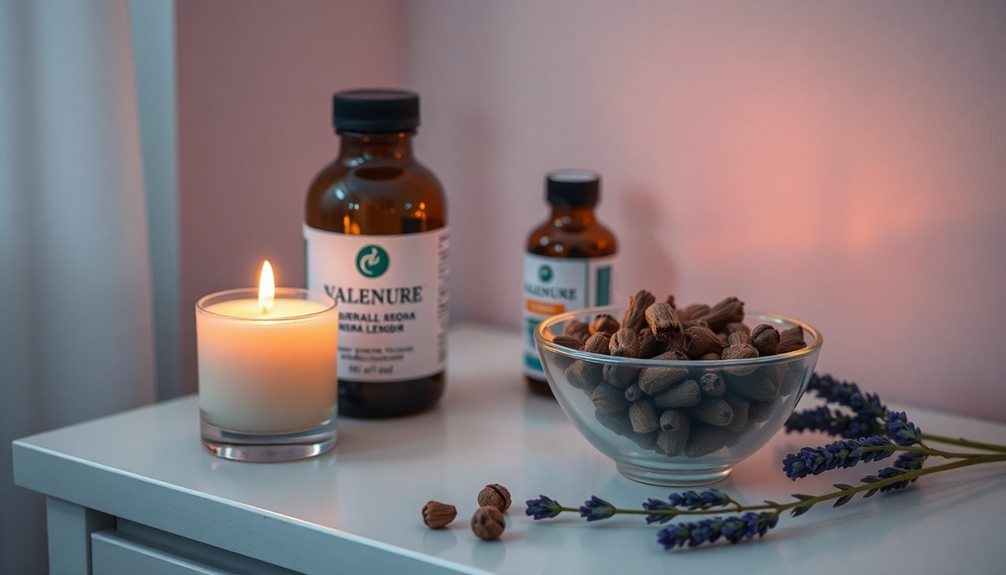
In addition to chamomile, other natural substances like GABA and 5-HTP have gained popularity for their sleep-promoting benefits. If you're struggling with insomnia, you may want to weigh these supplements to help regulate your sleep patterns.
GABA, or gamma-aminobutyric acid, is a neurotransmitter that helps calm your brain and promote relaxation. It can be taken as a supplement to increase the levels of GABA in your brain, leading to a more restful sleep.
You can also try 5-HTP, or 5-hydroxytryptophan, which is an amino acid that your body uses to produce serotonin. As serotonin levels increase, your body starts to produce melatonin, a hormone that regulates sleep. Taking 5-HTP supplements can help increase melatonin production, leading to better sleep quality.
When combined with GABA, 5-HTP can create a powerful sleep-promoting effect. You can find these supplements in capsule or powder form, and they can be taken separately or together. Always consult with a healthcare professional before adding any new supplements to your routine.
Lavender Oil for Sleep
Beyond traditional herbal supplements, you may want to ponder the sleep-promoting benefits of essential oils, particularly lavender oil.
Lavender oil has been a staple in aromatherapy for its calming effects, which can help you unwind before bed. When used in moderation, lavender oil can promote relaxation, reduce anxiety, and improve sleep quality.
You can incorporate lavender oil into your sleep routine in various ways:
- Diffusion: Use a diffuser to release the calming scent of lavender oil into your bedroom air, creating a peaceful atmosphere that fosters sleep.
- Topical application: Mix a few drops of lavender oil with a carrier oil and apply it to your skin, such as on your wrists or behind your ears, to promote relaxation.
- Bath soak: Add lavender oil to your bath water for a calming soak that can help you unwind before bed.
When choosing a lavender oil, guarantee it's high-quality and pure to reap its benefits.
Always follow the recommended usage guidelines to avoid any adverse effects. By incorporating lavender oil into your sleep routine, you may find it easier to fall asleep and stay asleep throughout the night.
Passionflower Sleep Aids
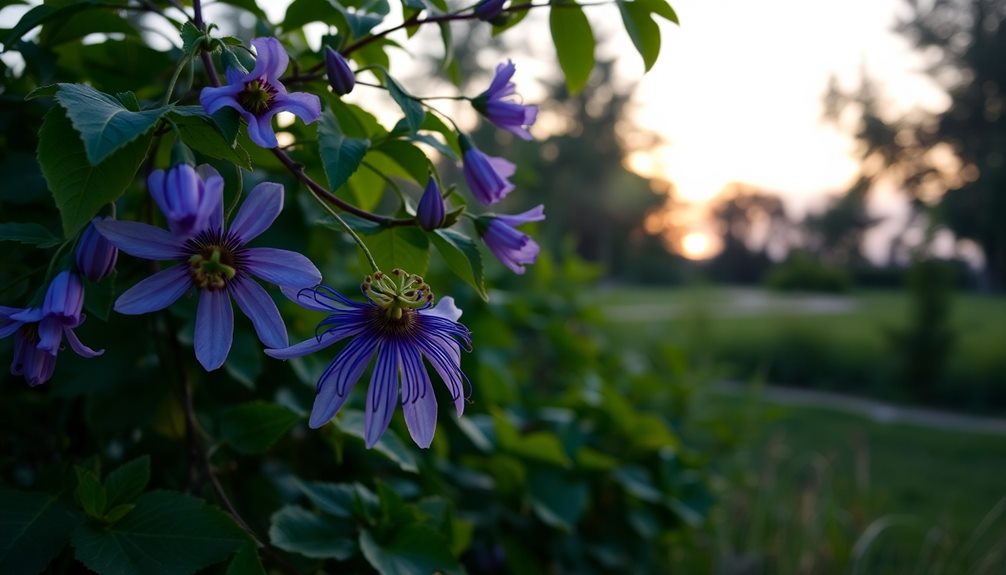
You're likely familiar with passionflower as a natural remedy for anxiety, but it also has a long history of use as a sleep aid.
As a sleep supplement, passionflower works by increasing the levels of a chemical called gamma-aminobutyric acid (GABA) in your brain, which helps regulate sleep patterns. Passionflower also has a calming effect on your nervous system, making it easier to fall asleep and stay asleep.
When using passionflower as a sleep aid, you can consume it in various forms, including tea, capsules, or tinctures.
Passionflower tea is a popular choice, as it's easy to make and can be consumed before bedtime. Capsules and tinctures are also convenient options, as they can be taken with water.
Passionflower is generally considered safe to use, but it's crucial to consult with a healthcare professional before taking it, especially if you're already taking medications or have underlying health conditions.
Some people may experience drowsiness or dizziness when taking passionflower, so start with a small dose and adjust as needed.
Hops and Sleep Quality
Hops, a key ingredient in beer, have a long history of use in herbal medicine, particularly when it comes to improving sleep quality.
You may not associate hops with sleep, but this herb has been used for centuries to calm the mind and body before bed.
The sedative properties of hops can help you relax and prepare for a restful night's sleep.
Studies have shown that hops can improve sleep quality by reducing symptoms of insomnia and anxiety.
If you're having trouble sleeping, consider adding hops to your bedtime routine.
Here are a few ways to use hops for better sleep:
- Tea: Steep dried hops in hot water to make a calming tea that can help you unwind before bed.
- Supplements: Take hops supplements in capsule or tablet form to get a concentrated dose of the herb's sedative properties.
- Combination formulas: Look for herbal sleep supplements that combine hops with other sleep-promoting herbs, such as valerian root or melatonin.
Ashwagandha for Stress Relief
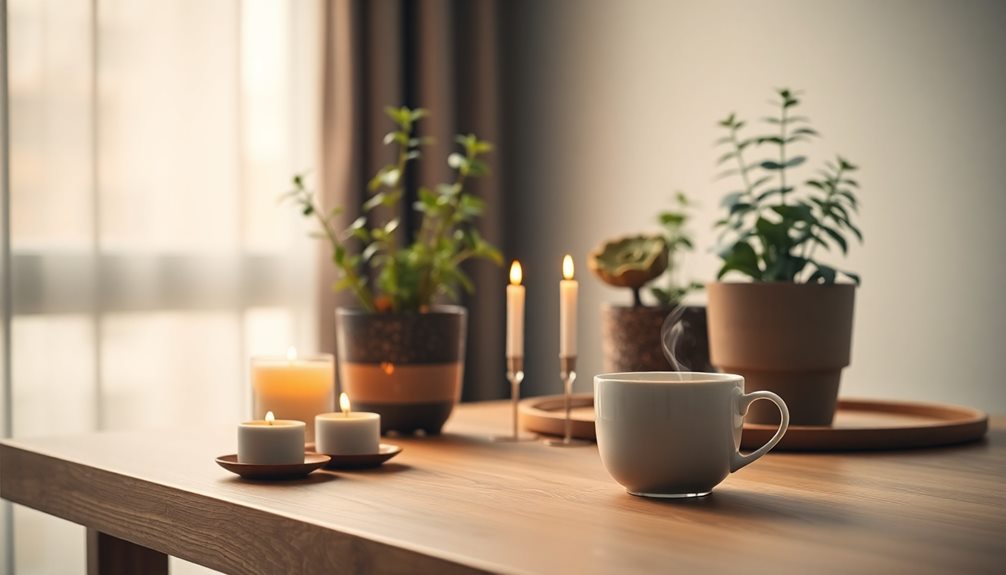
While managing stress is key to a restful night's sleep, it's not always easy to quiet the mind and relax the body. Ashwagandha, an ancient Indian herb, can help you achieve a state of calm and tranquility. It's commonly used in Ayurvedic medicine to reduce stress and anxiety, which are major contributors to insomnia.
| Ashwagandha Benefits | How it Works | Effects on Sleep |
|---|---|---|
| Reduces stress hormones | Blocks cortisol production | Helps you fall asleep faster |
| Relaxes the mind and body | Decreases inflammation | Improves sleep quality |
| Boosts mood | Increases serotonin levels | Reduces insomnia symptoms |
You can consume ashwagandha as a supplement or drink it as a tea. When combined with other sleep-promoting herbs, it creates a powerful sleep aid. Ashwagandha is also known to be safe and well-tolerated, making it a great option for those who struggle with stress-related insomnia. By incorporating ashwagandha into your sleep routine, you can wake up feeling refreshed and rejuvenated.
Lemon Balm Sleep Promoters
Nature has its own sleep remedies, and one of them is lemon balm, a herb that's been used for centuries to promote relaxation and calmness.
You can consume lemon balm in the form of supplements, teas, or even add it to your bath water for a calming effect.
The herb contains compounds like rosmarinic acid, which helps in reducing stress and anxiety.
When you're struggling with insomnia, lemon balm can be a useful addition to your sleep routine.
Here are some ways lemon balm can promote better sleep:
- Reduces anxiety and stress: Lemon balm has a calming effect on the mind and body, which can help you relax and prepare for sleep.
- Improves sleep quality: Studies have shown that lemon balm can improve sleep quality and duration, even in people with insomnia.
- Promotes relaxation: The herb can help you unwind after a long day, making it easier to fall asleep and stay asleep.
L-Theanine for Relaxation
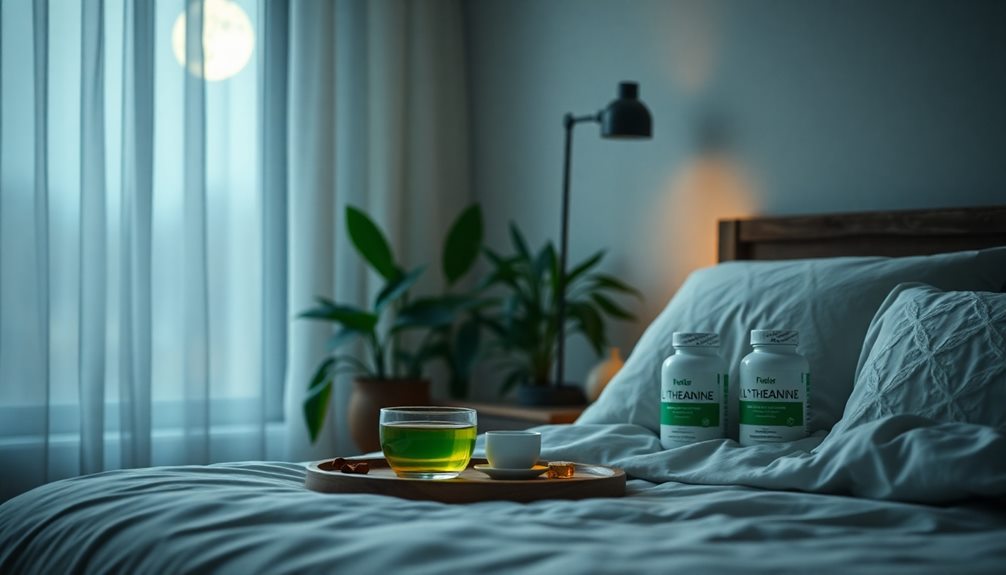
If you're looking for another natural way to unwind before bed, consider adding L-theanine to your relaxation routine. This amino acid is found in green tea and has been shown to promote relaxation, reduce stress levels, and improve sleep quality.
When you take L-theanine, it helps to calm your mind and body, making it easier to fall asleep and stay asleep.
You can take L-theanine supplements in various forms, including capsules, tablets, and powders. It's recommended to take 200-400 mg of L-theanine 30-60 minutes before bedtime. This allows the amino acid to take effect and help you relax before sleep.
L-theanine works by increasing the production of GABA, a neurotransmitter that helps regulate sleep and relaxation. It also reduces the levels of excitatory neurotransmitters, such as dopamine and norepinephrine, which can interfere with sleep. By promoting relaxation and reducing stress, L-theanine can be an effective natural sleep aid for people struggling with insomnia.
Frequently Asked Questions
Can Herbal Sleep Supplements Interact With Prescription Medications?
When you're taking prescription medications, it's crucial to weigh potential interactions with any supplements.
Herbal sleep supplements, in particular, can interact with prescription medications, especially those for blood thinners, diabetes, and blood pressure.
You might experience adverse effects, such as increased drowsiness or decreased medication efficacy.
Before taking herbal sleep supplements, you should consult your doctor to discuss potential interactions and guarantee safe use alongside your prescription medications.
How Long Does It Take for Herbal Sleep Aids to Work?
You've spent a million sleepless nights, and now you're impatient to know when relief will arrive.
Generally, herbal sleep aids can start working within a few days to a week of consistent use. However, it's crucial to remember that everyone's body is different.
Some people might experience the effects of herbs like melatonin or valerian root after just one dose, while others may need a few nights for their body to adjust.
Are Herbal Sleep Supplements Safe for Pregnant Women?
As you consider taking herbal supplements during pregnancy, you're right to wonder if they're safe.
Generally, it's best to exercise caution. Some herbal ingredients can stimulate the uterus or affect the baby's development.
You should always consult your healthcare provider before taking any supplements. They'll help you weigh the risks and benefits.
It's especially vital to avoid certain herbs like valerian root, as their effects on pregnancy aren't well understood.
Can I Take Multiple Herbal Sleep Supplements at Once?
When combining multiple herbal supplements, you're increasing the risk of adverse reactions.
You mightn't be aware of how different herbs interact with each other. Some herbs can amplify or even counteract each other's effects, putting your health at risk.
You should consult a healthcare professional before taking multiple herbal supplements to guarantee they're safe for you. They can help you weigh the benefits against the potential risks.
Do Herbal Sleep Supplements Have Side Effects on Libido?
As you navigate the intimate dance of sleep and desire, you may wonder if certain herbal supplements can disrupt the harmony.
When it comes to libido, some herbs can have a ripple effect. Certain herbal sleep supplements, like valerian root or lavender, are generally considered safe, but others, like melatonin or passionflower, might lower your sex drive.
You should monitor your body's response and adjust your supplements accordingly.
Conclusion
As you set out on a journey to find rest, remember that the best sleep is like a sweet siren's song – elusive, yet alluring. But with the right herbal supplements, you can lure Morpheus to your side. From valerian root to ashwagandha, these natural sleep aids can help you drift off to dreamland. So why let insomnia be the thief of your slumber? Try these supplements and let the sweet serenade of sleep lull you into a peaceful night's rest.

